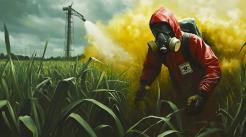
“Toxic chemicals have no business being in our food, our drinking water, or poisoning the farmworkers who put that food on our tables each day." Daniel Savery, (EarthJustice Senior Legislative Representative) September 2023
Regulating Pesticides for Cleaner Farming:
Transitioning Small and Large Farms from Toxic Chemicals
Key Speakers
|
Jim Hines, Vice-Chair of Executive Committee Santa Barbara/Ventura, The Sierra Club
|
|
Gricelda Covarrubias, Economic Innovation & Strategy Manager, Office of San Diego County Supervisor, District 1
|
Overview
The USDA's recent data and initiatives highlight the complex balance between agricultural productivity and environmental safety in pesticide use. The 2022 Pesticide Data Program Annual Summary reveals that over 99% of tested samples had pesticide residues below EPA benchmark levels, based on analysis of 10,665 samples across 23 commodities.
To address concerns about pesticide impacts, the USDA launched a significant $300 million Organic Transition Initiative in 2022. This program aims to reverse the 71% decline in non-certified organic farms since 2008 and supports farmers transitioning to organic production methods. The initiative provides comprehensive support through technical assistance, farmer-to-farmer mentoring, and direct financial aid for conservation efforts.
Recent scientific findings regarding glyphosate, one of the most widely used pesticides, demonstrate the ongoing debate about pesticide safety. While the International Agency for Research on Cancer classified glyphosate as "probably carcinogenic to humans" in 2015, subsequent studies by the National Toxicology Program indicate it is unlikely to cause cancer through DNA damage. However, research continues on other potential mechanisms of harm.
The USDA's approach now focuses on building resilient local and regional food production systems while ensuring safe, healthy food access. Through partnerships with local organizations and regional support networks, the initiative provides training, education, and outreach activities to help farmers adopt organic practices. This includes conservation planning, business development, and marketing support to overcome technical and financial challenges during the organic transition period.
The government has established multiple safeguards, including the Natural Resources Conservation Service's new Organic Management conservation practice standard and increased organic expertise throughout its regions. These efforts, combined with existing programs like the Organic Certification Cost Share Program, demonstrate a comprehensive approach to reducing pesticide dependence while maintaining agricultural productivity.
This webinar brings together leading experts who will address these critical issues through focused presentations on strategies and regulatory compliance, providing attendees with practical solutions and current research findings.
Program
• Access the USDA's $300 million Organic Transition Initiative for comprehensive support in transitioning to organic farming practices
• Review California's successful pesticide reduction model, which achieved an 11.5% decrease in pesticide use and 10.3% reduction in treated areas by 2021
• Participate in the new $379 million FARM initiative aimed at reducing agricultural chemical use across seven participating countries
• Understand current EPA pesticide regulations under FIFRA and FFDCA for registration and tolerance levels
• Examine barriers to organic transition including lack of financial support, certification complexity, and market access challenges
• Implement Integrated Pest Management (IPM) strategies to reduce chemical pesticide dependence while maintaining crop yields
• Address the economic impact of pesticide use, considering that farmworkers face up to 400 times higher exposure levels than national averages
• Consider biodiversity impacts, as pesticides are identified as the second leading cause of worldwide insect population decline
• Evaluate the EU model of setting binding national targets for pesticide reduction and clear rules for IPM implementation
• Connect with regional organic specialists through USDA Service Centers for technical assistance during the three-year transition period
Who Should Attend?
- Agricultural Equipment Manufacturers
- Agricultural Extension Officers
- Agricultural Investment Advisors
- Agricultural Policy Analysts
- Agricultural Policy Makers
- Agricultural Scientists
- Agricultural Supply Chain Managers
- Agricultural Technology Developers
- Conservation Organizations Leaders
- Environmental Justice Advocates
- Environmental Protection Officers
- Farm Owners/Operators
- Food Industry Executives
- Integrated Pest Management Specialists
- Organic Farming Specialists
- Pesticide Regulators
- Public Health Officials
- Research Institution Representatives
- Soil Health Specialists
- Sustainability Consultants
Forthcoming Events
Sponsorship and Exhibition Opportunities
If you’re interested in promoting your company, products and/or services at our events, please click here to enter your details and we will contact you directly.
Alternatively, please call
+1 (310) 385 8750 for more information.
